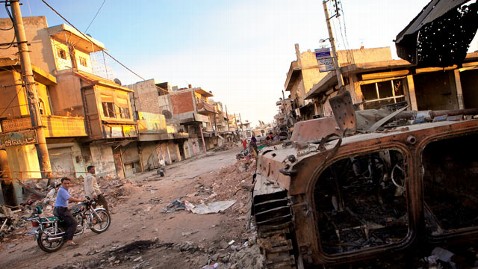Escalating Violence in Syria Doesn't Equal Civil War, Activists Say
 (AFP/Getty Images)
(AFP/Getty Images)
In Paris on Friday at the Friends of Syria meeting, Secretary of State Hillary Clinton railed against the regime of Bashar al-Assad: "It's against human decency for a government to be murdering its own people."
As violence in Syria escalates by the day, some activists and media are calling the crisis a sectarian conflict that will turn into a civil war; others maintain it's still a regime at war with its people.
"This did not begin as a civil war, but we are seeing more and more sectarian tensions," a Syria researcher, who works undercover for Human Rights Watch, told ABC News. "There has been internal armed conflict for a long time now, and it's not turning into a simple case of one sect versus another. But a model of vigilante justice is developing, and we will see more of it."
The researcher, who asked not to be named, added that, because violence has continued for so long in Syria, "it's not clear to either side how they would benefit from talks."
A stalemate in talks has characterized the response of the international community throughout the 16-month conflict, which has claimed more than 16,500 lives, according to the Syrian Observatory for Human Rights, a non-profit organization based in the U.K. that's opposed to the Syrian government.
"We have heard all nice talks in a series of conferences, but at the same time ships of weapons still come to the regime," Mohammad, a member of the Syrian Revolution General Commission, a non-violent anti-regime group, told ABC News. "Russian and Iranian ships are not bringing roses."
While most of his family remains in Syria, Mohammad hasn't been back since the uprising began, working instead on destabilizing the Assad regime through social media and informing people about what is happening in his country.
"As I watched some of the Paris conference, I came back to my laptop and wrote in Arabic one sentence, 'We have no-one but God on our side'," he said.
"This is what the international community should understand: Time is not on Syria's side nor on the international community's side," said Nadim Shehadi, an associate fellow at the Middle East Program at Chaltham House, an independent think-tank on international affairs.
Shehadi said that the crisis in Syria constituted a political and non-violent revolt against the Assad family and his regime, and that elements of sectarian violence were an unfortunate offshoot of the violent struggle that grew out of the protest movement. This view is largely shared by opposition activists.
"No way that the civil war is going to happen," said Mohammad. "The Free Syria Army only attacks army and shabiha not the Alawite citizens."
Shabiha are gangs that have long been a feature of the Assad regime, implicated in illegal trade, smuggling and the personal protection of Assad and his extended family, according to activists and researchers. As the crisis unfolded in Syria, they have been recruited as para-militaries and used in government raids and crackdowns across the country.
"With this uprising, the military has found itself with a dilemma," Abdul Wahad Sayedomar, a British-based activist, told ABC News. "The high-ranking officers are typically Alawite, like Assad. But the majority of troops are conscripts, and since Syria is 85 percent Sunni, there is growing fear that they may not all be loyal."
With Sunni Muslims making up most of the Syrian population, the remaining 15 or so percent is comprised of Alawite, who are Shia, and other Shia denominations, as well as various Christian sects and other minority religions.
"The simple story is that we witnessed a momentum in civil uprising and parallel to that, a momentum of violent oppression formed. It is not civil war, but a state in war against its people," said Sayedomar.
Sayedomar described receiving reports about shabiha Alawites, who do not carry heavy weapons, accompanying government forces to conflict; either waiting for shelling from a distance to finish and then moving in to commit atrocities in towns and villages, or forming a back squadron to accompany troops during raids, ensuring that nobody defects.
Another activist who asked to remain anonymous maintained that the conflict, however seemingly sectarian, was not a civil war.
"From the start we were brothers and sisters, then the regime began scaring them. That is, Bashar [al-Assad] goes, you will be executed by Sunnis," he said. "Now Alawites will do all they can to keep him in power. You should note that if an Alawi is caught in a protest their punishment and torture is far worse than a Sunni - double and more."
Referring to recent YouTube showing sectarian strife, Shehadi said that violence would beget violence, as long as the Syrian opposition felt they stood alone against the Assad regime.
"The dictatorship tries to create the myth that it's either them or all hell breaks loose. We fall into that trap by believing there is going to be a civil war after the regime falls."